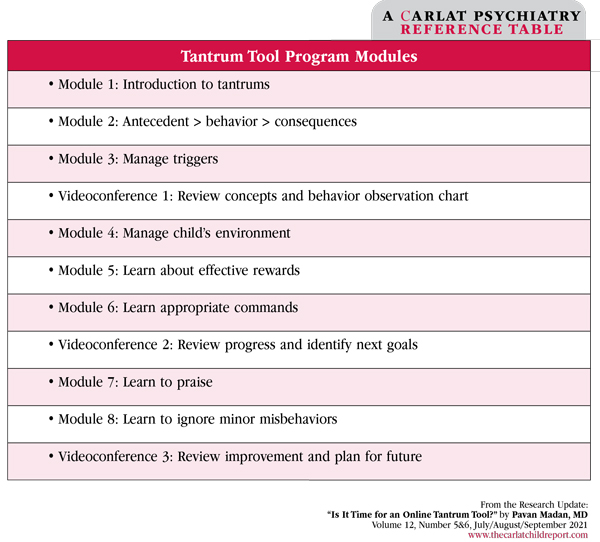Home » Is It Time for an Online Tantrum Tool?
Is It Time for an Online Tantrum Tool?
July 14, 2021
From The Carlat Child Psychiatry Report
Pavan Madan, MD.
Dr. Madan has disclosed no relevant financial or other interests in any commercial companies pertaining to this educational activity.
REVIEW OF: Diaz-Stransky A et al, J Child Adolesc Psychopharmacol 2020;30(9):558–566
Study TYPE: Open pilot study
We often encounter children with disruptive behaviors, but tools to address these issues are few. Although parent management training (PMT) is an effective treatment for disruptive behaviors, access to quality PMT is limited in most places. Online PMT programs exist, but most lack active support from trained clinicians and have poor completion rates among parents. To address this need, the authors of the current study examined the feasibility and utility of a clinician-supported virtual PMT program.
Researchers at the Yale Child Study Center enrolled 15 children (13 boys and 2 girls) aged 3–9 years (mean 5.2 years). They screened participants using semi-structured interviews and DSM-5 criteria. Common diagnoses included oppositional defiant disorder (ODD), disruptive mood dysregulation disorder, and attention deficit hyperactivity disorder.
Parents received PMT via eight 10-minute animated and interactive online modules (see table on page 10), providing practical guidance in everyday scenarios. After the third, sixth, and eighth online module, parents participated in a 45-minute videoconference session to review progress.
After 8 weeks of the intervention, parents reported changes in symptoms via the Disruptive Behavior Rating Scale (DBRS; eight ODD symptoms on a 0–3 scale) and Affective Reactivity Index (ARI; seven irritability questions on a 0–2 scale), and intervention acceptability via the Patient Satisfaction Questionnaire (PSQ; eight acceptability questions on a 1–4 scale).
Remarkably, around 90% of parents completed the online modules and video sessions. Parents who completed the study found the program satisfactory (PSQ score = 26.5) and reported around a 50% reduction in their kids’ disruptive behaviors (DBRS score 13.5 > 7.3) as well as irritability (mean ARI score 7.2 > 3.75). The improvements appear to be clinically meaningful and experienced at rates similar to those seen in the regular in-person PMT programs.
The main drawbacks of this study were its very small sample size, lack of control group (which allows for an open label–type bias), lack of clear generalizability since it was conducted in a school setting, and the need for in-person screening for the virtual intervention.
CCPR’s TAKE
Despite the many limitations, this study shows that a brief online program along with just three video sessions by a trained clinician shows promise in delivering effective PMT to so many of our patients’ families who otherwise do not have access to it. There is a need for such tools as a public health measure, and we hope to see the tool released for general use and independent larger, controlled study by unaffiliated researchers.
Child PsychiatryStudy TYPE: Open pilot study
We often encounter children with disruptive behaviors, but tools to address these issues are few. Although parent management training (PMT) is an effective treatment for disruptive behaviors, access to quality PMT is limited in most places. Online PMT programs exist, but most lack active support from trained clinicians and have poor completion rates among parents. To address this need, the authors of the current study examined the feasibility and utility of a clinician-supported virtual PMT program.
Researchers at the Yale Child Study Center enrolled 15 children (13 boys and 2 girls) aged 3–9 years (mean 5.2 years). They screened participants using semi-structured interviews and DSM-5 criteria. Common diagnoses included oppositional defiant disorder (ODD), disruptive mood dysregulation disorder, and attention deficit hyperactivity disorder.
Parents received PMT via eight 10-minute animated and interactive online modules (see table on page 10), providing practical guidance in everyday scenarios. After the third, sixth, and eighth online module, parents participated in a 45-minute videoconference session to review progress.
After 8 weeks of the intervention, parents reported changes in symptoms via the Disruptive Behavior Rating Scale (DBRS; eight ODD symptoms on a 0–3 scale) and Affective Reactivity Index (ARI; seven irritability questions on a 0–2 scale), and intervention acceptability via the Patient Satisfaction Questionnaire (PSQ; eight acceptability questions on a 1–4 scale).
Remarkably, around 90% of parents completed the online modules and video sessions. Parents who completed the study found the program satisfactory (PSQ score = 26.5) and reported around a 50% reduction in their kids’ disruptive behaviors (DBRS score 13.5 > 7.3) as well as irritability (mean ARI score 7.2 > 3.75). The improvements appear to be clinically meaningful and experienced at rates similar to those seen in the regular in-person PMT programs.
The main drawbacks of this study were its very small sample size, lack of control group (which allows for an open label–type bias), lack of clear generalizability since it was conducted in a school setting, and the need for in-person screening for the virtual intervention.
CCPR’s TAKE
Despite the many limitations, this study shows that a brief online program along with just three video sessions by a trained clinician shows promise in delivering effective PMT to so many of our patients’ families who otherwise do not have access to it. There is a need for such tools as a public health measure, and we hope to see the tool released for general use and independent larger, controlled study by unaffiliated researchers.
Table: Tantrum Tool Program Modules
(Click to view full-sized PDF)
Issue Date: July 14, 2021
Table Of Contents
Recommended
Newsletters
Please see our Terms and Conditions, Privacy Policy, Subscription Agreement, Use of Cookies, and Hardware/Software Requirements to view our website.
© 2026 Carlat Publishing, LLC and Affiliates, All Rights Reserved.



_-The-Breakthrough-Antipsychotic-That-Could-Change-Everything.webp?t=1729528747)



